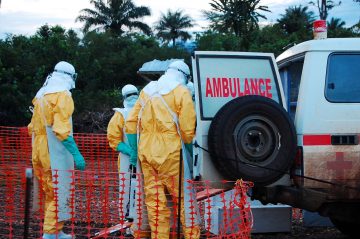The hardest part
Most of the care for EVD patients is supportive nursing care provided by national and expat nurses – feeding, oral hydration, cleaning, dressing, wound care, comforting, giving oral meds and taking temperatures. The expat doctors and the CHOs (community health officers – similar to physician assistants) start and stop intravenous fluids, place and remove intravenous cannulas, draw blood, assess and monitor the clinical condition, develop a treatment plan, prescribe medication and decide when to do a follow-up Ebola lab test. A follow-up Ebola blood test is done only after three days with no fever or symptoms, that is, when the patient appears ready for discharge.

A team of hygienists try to move two patients who are too weak to move. In the five hours that it took for the ambulance to reach the MSF Case Management Centre in Kailahun, one of the patients died. Access to care is heavily constrained due to a severe shortage in ambulances, lack of treatment centres in the country and a struggling surveillance system. As of the end of October 2014, MSF has received over 900 admissions of which some 616 have been confirmed cases. Over 280 survivors have so far been discharged from the centre in Kailahun. ©Fathema Murtaza, MSF
The hardest part for me is not the heat, the boredom, the PPE, the lack of an Ebola treatment or even the presence of disease, death and grief. The hardest part is deciding what role to take. It would definitely be easier and perhaps more rewarding to ‘just do it’ – deliver myself whatever care or intervention is needed for each patient and let the local staff watch and learn. That approach might have a discernable effect on individual patients but not much of an impact on the general epidemic or in building capacity among Sierra Leonean health care workers. By the Super Bowl, I will be long gone and they won’t. The urgency of Ebola demands the most vertical of all initiatives – a one-disease program. In such a situation, the learning opportunities are scarce. My tendency is usually to provide support and guidance when necessary to the national staff as they deliver the direct care. But, it is always difficult to know what each one can do efficiently, where each one needs help and what each one cannot do at all. I’ll figure it out eventually.
When Ebola retreats into the jungle from whence it came, the health care system in all three Ebola-affected countries will need to be rebuilt from the ground up. If the donors and NGOs stay on to support this process, maybe that system will be better than before. It could hardly be worse. Everything is “no touch.” We don’t even do malaria rapid tests anymore because of the risk from blood and sharps. Sierra Leoneans rarely touch each other these days and expats are instructed never to touch another person unless in PPE and to avoid touching inanimate objects as well. Even in the MSF compound, we do not touch each other unless by accident. In dealing with patients at the staff clinic, at triage and at admitting, we take a verbal history from 2 metres away, separated by 2 fences. A profession in which the goal is a specific diagnosis and an individualized treatment based on history, physical exam, lab and X-ray has been reduced to an impersonal guessing game. I don’t disagree with this but it does feel strange.